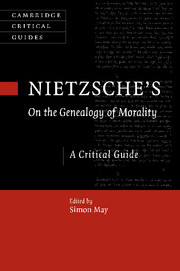Book contents
- Frontmatter
- Contents
- Contributors
- Acknowledgements
- Note on texts, translations, and references
- Introduction
- Chapter 1 The future of evil
- Chapter 2 On the nobility of Nietzsche’s priests
- Chapter 3 The genealogy of guilt
- Chapter 4 Why Nietzsche is still in the morality game
- Chapter 5 Who is the “sovereign individual”? Nietzsche on freedom
- Chapter 6 Ressentiment and morality
- Chapter 7 The role of life in the Genealogy
- Chapter 8 The relevance of history for moral philosophy
- Chapter 9 Why would master morality surrender its power?
- Chapter 10 “Genealogy” and the Genealogy
- Chapter 11 The promising animal
- Chapter 12 Nietzsche and the “aesthetics of character”
- Chapter 13 Nietzsche and the virtues of mature egoism
- Chapter 14 Une promesse de bonheur? Beauty in the Genealogy
- Bibliography
- Index
Chapter 3 - The genealogy of guilt
Published online by Cambridge University Press: 05 November 2011
- Frontmatter
- Contents
- Contributors
- Acknowledgements
- Note on texts, translations, and references
- Introduction
- Chapter 1 The future of evil
- Chapter 2 On the nobility of Nietzsche’s priests
- Chapter 3 The genealogy of guilt
- Chapter 4 Why Nietzsche is still in the morality game
- Chapter 5 Who is the “sovereign individual”? Nietzsche on freedom
- Chapter 6 Ressentiment and morality
- Chapter 7 The role of life in the Genealogy
- Chapter 8 The relevance of history for moral philosophy
- Chapter 9 Why would master morality surrender its power?
- Chapter 10 “Genealogy” and the Genealogy
- Chapter 11 The promising animal
- Chapter 12 Nietzsche and the “aesthetics of character”
- Chapter 13 Nietzsche and the virtues of mature egoism
- Chapter 14 Une promesse de bonheur? Beauty in the Genealogy
- Bibliography
- Index
Summary
The second essay of On the Genealogy of Morality ostensibly develops an account of the origins of the feeling of guilt, which is marked by the appearance of tight conceptual cohesion: the essay begins with an analysis of the concept of conscience, proceeds to an examination of bad conscience, and concludes with a view of moral bad conscience, or guilt itself, with an emphasis throughout the essay on the crucial influence of socialization on the development of all these phenomena.
Still, there remains much disagreement among commentators over the precise structure of the account Nietzsche develops in that essay. In this chapter, I shall propose a new interpretation of this structure, which keeps to the conceptual resources Nietzsche actually offers in the essay. My objective is therefore primarily exegetical and, in some respects, modest, for although this chapter supplies (arguably) the groundwork for a philosophical exploration of Nietzsche’s account by circumscribing its philosophical stakes, it does not engage very far in such an exploration.
- Type
- Chapter
- Information
- Nietzsche's On the Genealogy of MoralityA Critical Guide, pp. 56 - 77Publisher: Cambridge University PressPrint publication year: 2011
- 7
- Cited by

